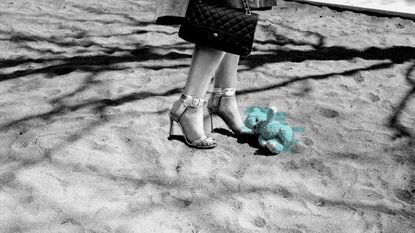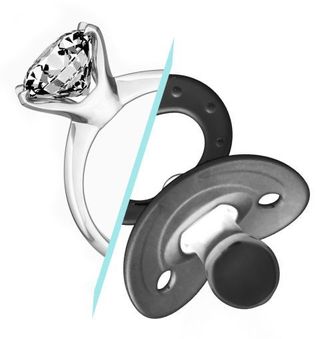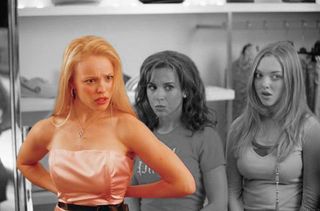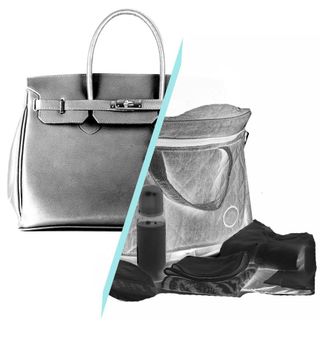
You can't identify a mean mom by her Birkin bag or her lycra Lululemons. She comes in all sizes and socio-economic classes and lives in no specific zip code, rearing her head in the heartland, crunchy California, the Deep South, New York City. But you know a mean mom when you meet one: She criticizes your parenting style, calls you out on Facebook, or slathers you in snark. These are the mean girls, all grown up and blossomed into adult bullies with kids of their own. You've probably encountered a few at your local playground. Hell, maybe you are one.
In a survey released earlier this month, 80 percent of millennial moms said they've been shamed by other moms. High as that number is, I'm not surprised. At a party last summer I overheard a group of women—all of whom are mothers—bashing a new mom who'd just left to relieve the babysitter. Rather than commiserating about the first year of motherhood, they judged her behind her back for still breastfeeding a not-yet-one-year-old child. Not that the age of the baby really mattered—women are also criticized by other women for not breastfeeding long enough. Or for not breastfeeding at all. As I write this, there's a comment war happening on a friend's Facebook page over this article about whether it's selfish to bottle feed your baby. You're damned if you do and damned if you don't with these women.

A doctor from Berkeley told me about the gossipy matriarchs she met when her toddler-age son was taking swim lessons. "There was a group of moms, who, week after week, would not talk to me, so I just hung out alone. One day they had a loud conversation about how awful 'those working moms who abandon their children in daycare' are." At the time, she was working a lot, which she enjoyed, and thinking about having another baby. The moment struck a chord. "I had a total meltdown that night."
How could she not? These topics—breastfeeding, going back to work, literally any choice you make as a parent—are loaded, and they're especially fraught now that they're more visible than ever before. Anyone who follows you on Instagram can tell (or thinks they can) how much time you're spending with your kid. Anyone feels entitled to comment.
I hesitate to blame pop culture for the mom-on-mom hate, but life does imitate art. Our parents' generation grew up watching scripted sitcoms with impeccably behaved children (The Brady Bunch, Happy Days) and modeled their own actions accordingly. But as our entertainment appetites evolved, so did the way we treat each other. Nicole Martins, a professor of telecommunications at Indiana University, conducted a study linking aggressive behavior—mostly in young women—to shows with stars she deemed socially aggressive. Girls who watched The Simple Life as teens in the mid-aughts are now moms hooked on The Real Housewives.
IIn the early 2000s we had a new type of bad girl…white, middle-class, and suburban, with a promising future.
The fact that Mean Girls came out in 2004, when today's young moms were in high school or college, is not a coincidence. Art, too, imitates life. Tina Fey was inspired to write the script after reading the 2002 non-fiction book Queen Bees and Wannabes by Rosalind Wiseman, in which the writer observed "the tiny ways that girls go after each other." Bullying research during this time found that girls can be aggressive—not in the obvious, physical way boys can be, but in subtler, more indirect ways. Countless articles and news segments at the start of the 21st century focused on the new phenomenon of female bullies, dissecting the idea that girls are socially competitive creatures striving to be popular and powerful—and victimizing others in the process.
"In the early 2000s we had a new type of bad girl…white, middle-class, and suburban, and [with] a promising future," writes Anita Harris in her book All About the Girl: Culture, Power, and Identity. Wiseman notes that those who are privileged are so accustomed to their power that they don't recognize when they're dominating and silencing others. Much like Regina George. And the former popular girl now sitting next to you in the pediatrician's office.
Stay In The Know
Marie Claire email subscribers get intel on fashion and beauty trends, hot-off-the-press celebrity news, and more. Sign up here.

Jennifer Mayer, 33, owner of a doula support service in Brooklyn, says that being a new mom feels like high school all over again. For her, "mom meet-ups" became so judgmental that she had to stop attending altogether. She recalls one particular day when a group of moms were swapping birth stories: "I was shy to speak up because I gave birth at home and people think you're crazy for doing that. But I decided that I'll just share my story, because it's mine, but also, I want to help normalize homebirth." Mayer says that she was shamed by another mom who declared that she would never risk her own child's life that way. The intentional dig coupled with postpartum hormones was an awful experience for Mayer. "Insinuating that I risked my son's life by my birth choice was the meanest thing someone could say to me."
While it might seem paradoxical that mature women would be cruel to each other when they, presumably, are raising their children to be kind, it's bullying 101: Belittling someone else's choice makes you feel better about your own. Art Markman, Ph.D., professor of psychology at the University of Texas and author of Brain Briefs, points to the scientific and historical evidence that people within a social group—like women with kids around the same age—gain stature by tearing down others around them. "It's easy to maintain a sense of group cohesion by creating a distinction between an in-group and an out-group," he explains. By being mean to outsiders, the clique is strengthened and the mean moms' status in the group rises. Yes, it's all very junior high—and no, it's not uncommon in adulthood. "It is actually a deep part of human social interactions," says Markman. The way he puts it, bullies are narcissists, and narcissists prop up their self-esteem through the energy of other people. "You see this in-group and out-group behavior in business, with fans of sports teams, and with cliques of moms."
Blame evolution: A study by researchers at Simon Fraser University found that bullying provided an adaptive edge for our ancestors. Bullies often have high social status and tend not to be anxious or depressed, which Markman attributes to the fact that "successful narcissists surround themselves with people who increase their confidence, then use their power to keep themselves at the top of the heap."

Mean Girls, 2004
Nowadays the victims of those bullies end up, more and more often, on the therapist's couch. Heather Quinlan, a psychotherapist in Connecticut, has many patients who deal with the mean mom issue: "Whether it's a mom being snarky, exclusionary, judgmental, manipulative or outright cruel, it can cause major distress in the women on the receiving end of the behavior, and creates hugely unhealthy relationships," she says.
Even celebrities, as perfect as their lives may seem, aren't sheltered from mean moms. Chrissy Teigen's refreshingly honest social media presence is a repeated target for mom-shaming, resulting in everything from criticism for a date night not long after her baby was born to reproach of rosy eczema on her daughter's cheeks. Hilary Duff was chastised for kissing her son on the lips at Disneyland (he's four years old). Kristin Cavallari was told that her children looked too thin after she posted a photo of them in swim trunks. All three women used their status and social platform to fight back.
Teigen came to Cavallari's defense: "I will never know why parents criticize others so harshly, knowing they'd go insane if they were on the receiving end ALLTHETIME," she tweeted. "NO parent out there thinks they're perfect. I loathe these sh**head commenters. Who would want to make someone feel horrible for fun?"
RELATED STORY

Apparently, a lot of people. (Duff's post, for one, received more than 8,000 comments.) Because the hate, while often masked as looking out for the child's well-being, isn't even necessarily about motherhood—it's about interpersonal habits. "Yes, at times the behaviors are a result of women trying to compensate for low self-esteem," says Quinlan. "But sometimes mean moms are mean to other people in general. Family members, co-workers, waiters, cashiers—it's just the way they go through life."
Wherever it stems from, the aggression has been enabled and enhanced by social media (no surprise here). Jona Garrett, 36, of Rogersville, Missouri, says that her first experience with mom bullying was while she was pregnant and joined community boards online. "First-time moms would ask a reasonable question—not like 'Can I give my baby heroin?', but about when they could introduce solids, that sort of thing. The women on the boards would shame them, saying that their child would never amount to anything. I was too afraid to ever ask a question." Her son is now eight, but the pressure hasn't let up. "My son's class has homeroom moms that go all out," she says of the expectation that you should do the same. "When I was little, you were lucky if you got a juice box and a cookie in school, but these moms recently put on a sundae bar with more toppings than a TCBY. The kids didn't even know what to do with it."
In a world dominated by Pinterest and Instagram, is being a mother (which women have been doing since the beginning of time, mind you) starting to become an endless race towards perfection, lest you get called out for being anything less? Do we all have to keep up with the clever birth announcements, the gender reveal parties, the elaborate maternity shoots, the professional post-birth shots in the hospital ward? I recently came across a post in my feed of a beautiful blonde woman wearing an off-the-shoulder shirt with #MomLife scrolled in gold letters across the front. It's all a perfectly curated existence, this motherhood thing.

"Mean mom behavior can be exacerbated by shaky self-esteem and a drive to be more successful, happier, richer, prettier, and 'better than' other moms—and social media can be a triggering factor," Quinlan says.
For Garrett, Facebook—with mothers posting pictures from every event of a child's life—is partially responsible for the negativity. "It can make you feel like you're doing a bad job as mom," she says. So she now tries to add some balance to the ecosystem. "I might post a photo of my daughter throwing a fit or my son flipping someone off," she says. "We're not a perfect family and I don't want to act like one online." So far, no shame. When Garrett posted a Facebook video of her daughter crying on the first day of school, she got comments like "this is me going to work" and "that's why we have them—to torture them!" The realism is relatable, but not many women are willing to put it out there.
I asked my own mother, 61, if she experienced mean mom behavior while raising me and my siblings. She said that the mothers she associated with were just trying to pay their bills, do the chores, and get the kids out the door and off to school. There weren't platforms for judgement where moms could compare each other. When I was born, there was no What to Expect When You're Expecting, let alone Bringing Up Bebe: One American Mother Discovers the Wisdom of French Parenting. "We only had our parents, doctors, but mostly our friends to rely on for advice for raising kids, so why would we be mean to each other?"
Markman says that living further from our extended families is another reason for the rise of mean moms. "One of the key things about parenting is that it's hard to do. In the past, when people tended to live closer to their relatives, you got help as well as day-to-day advice from siblings, aunts and uncles, cousins, and parents. That gave you a sense of whether you were doing it right, which helps to stave off the anxiety of parenting in general."

The moms of Big Little Lies try to protect their children from bullying, all the while bullying each other.
Maybe moms today—with the pressure to be selfie-level beautiful, to cook Instagram-worthy (organic) meals, to plan lavish playdates, and to maintain a career so they can, in many cases, not just contribute to their household but be the breadwinner or even the sole source of income—are just too damn exhausted.
Lindsay Powers Eichmann, 34, a working mother of two, admits to engaging in mean mom behavior herself. "I have had a couple of moments of inadvertent mean girl-ness. Once I fired off a group email, while juggling my baby and pumping concurrently, that came off the wrong way and hurt another woman's feelings," she says. It's easy to see how this can happen: an otherwise lovely person being not-so-nice because she's overwhelmed. "I was busy and tired and distracted and quickly wrote back without thinking. When I re-read the email later, I felt awful because it was just so not me."
Eichmann thinks part of the mean-mom problem is a lack of parenting empathy from society at large. Everyone feels like they're failing somewhere, people are already on edge, and one stupid comment can spiral out of control. She's on to something. According to a Pew Research Center survey, working parents say they feel stressed, tired, rushed, and short on quality time with their children, friends, partners, and hobbies. More than one-third of working parents say that parenting is stressful all or most of the time.
Who would want to make someone feel horrible for fun?
Maybe mean-girl behavior like the breastfeeding wars wouldn't exist if women and their partners had more support like paid parental leave. They wouldn't have to stress about pumping, running back to work, how they're going to afford childcare, whether they'll have the time to care for a newborn. "We all need to put our energy into fighting the bigger-picture problems instead of playing mean girls at the playground," Eichmann says.
Nowhere have the unrealistic expectations of moms—and the advantage privileged women can have as mothers in this country—been clearer than on HBO's recent hit show Big Little Lies, which was a serious Sunday-night dose of birth control. Not because of the kids, who are sweet and adorable and basically perfect. But because of the always-way-too-put-together moms who feed on frivolous female rivalry and sling profanities like "Get laid, bitch" in the school drop-off line. If this is any reflection of how motherhood has evolved, it's no wonder we're the bully-est bunch in history.
So can we all agree to dispense with the maternal malice and, I don't know, support fellow child-rearers? Being a mother is tough enough without all the shame and judgement. "You're always second-guessing yourself," says Garrett. "If you're a normal parent, you're thinking, 'I'm a horrible parent.' You don't need anyone else saying it for you."

-
 Olivia Rodrigo Finds the Perfect Spring Dresses at Reformation
Olivia Rodrigo Finds the Perfect Spring Dresses at ReformationShe's worn the brand twice in the past week.
By Julia Marzovilla Published
-
 Curiously, Just as Meghan Markle Sends Samples of Her New Strawberry Jam Out, the Buckingham Palace Shop Starts Promoting Its Own Strawberry Jam on Social Media
Curiously, Just as Meghan Markle Sends Samples of Her New Strawberry Jam Out, the Buckingham Palace Shop Starts Promoting Its Own Strawberry Jam on Social MediaThe clip promoting the Buckingham Palace Shop’s product—we cannot make this up—is set to Mozart’s “Dissonance Quartet.”
By Rachel Burchfield Published
-
 Zendaya's Latest 'Challengers' Serve Is Nearly a Century Old
Zendaya's Latest 'Challengers' Serve Is Nearly a Century OldThe 1930s-era dress may have been pulled months ago.
By Halie LeSavage Published